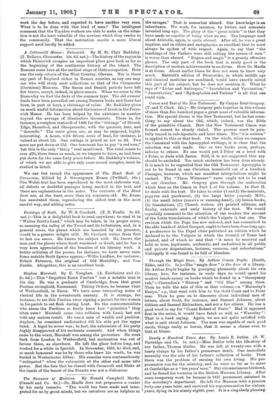.Canon and Text of the New Testament. By Caspar Rene
Gregory. (T. and T. Clark. 12s.)—Mr. Gregory puts together in this volume of more than five hundred pages a great mass of valuable informa- tion. His special theme is the New Testament, but he has some- thing to say about the Old, which, indeed, was the Bible of the primitive Church. How the New Testament Canon was formed cannot be clearly stated. The process must be pain- fully traced in sub-Apostolic and later times. The "it is written" is applied to this or that book. On the whole, when we compare the Canonical with the Apocryphal writings, it is clear that the selection was well made. Ono or two books seem, perhaps, inferior to others. No one would put 2 Peter on a level with 1 Peter, or Jude with James. Still, it is not suggested that any should be excluded. Too much exclusion has been done already. It is much to be regretted that the Old Testament Apocrypha is not to be found in one Christian household out of a hundred. Passages, however, which are manifest interpolations might be excised. The "Three Witnesses" verse ought not to be read in our churches. Mr. Gregory goes through the authorities which bear on the Canon in Part I. of his volume. In Part II. he deals with the text. He takes in order (1 and 2) the materials, papyrus and parchment, (3) the large letter (uncial) MSS., (4) the small letter (cursive or running-hand), (5) lesson-books, (6) translations, ('7) Church writers, (8) printed editions, and finally, externals and early history of the text. We would especially commend to the attention of our readers the account of the Latin translations, of which the Vulgate is but one. The revision which the Pope has now ordered, and has committed to the able hands of Abbot Gasquet, ought to have been done long ago. A predecessor in the Papal chair published an edition which he declared to be the Vulgate to which the Council of Trent had pointed, and of which he said that "it must be received and held as true, legitimate, authentic, and undoubted in all public and private disputations, lectures, sermons, and exhortations." Unhappily it was found to be full of blunders.










































 Previous page
Previous page